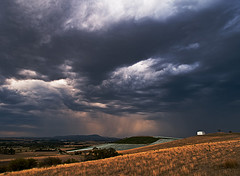Right, having restarting the blogging engine, here's a much-delayed edition of climate cuttings. Some of these are quite old now, having sat waiting for me to click the publish button for a month now. Still - there's some interesting stuff out there.
 A paper published in The Holocene said that there was a surge in summer storms in Britain in the 1680s and 1690s - the depths of the Little Ice Age. This rather dents recent theories that summer storms are being caused by global warming.
A paper published in The Holocene said that there was a surge in summer storms in Britain in the 1680s and 1690s - the depths of the Little Ice Age. This rather dents recent theories that summer storms are being caused by global warming.
The Hockey Stick reared its ugly head again! Michael Mann's dodgy reconstruction of past temperatures appears in the pages of an important US report on climate. Still more remarkably it's in the variant where the thermometer record is tacked on to the end of the reconstruction to make it look more scary, with not a word of explanation that this is what has been done. Junk science from the US government, it seems.
 And a few weeks later Dr Mann tried it on again, publishing a new take on paleoclimate, which quickly reduced readers at Climate Audit to tears of laughter as problem after problem with the data came to light. The cock-ups didn't so much crawl out of the woodwork, as fart up into the firmament like so many damp squibs. The full story is ongoing over at Climate Audit. I'd try to point you to a relevant place but there are so many threads outlining all the things wrong with this study that it's a full time job keeping up with them all.
And a few weeks later Dr Mann tried it on again, publishing a new take on paleoclimate, which quickly reduced readers at Climate Audit to tears of laughter as problem after problem with the data came to light. The cock-ups didn't so much crawl out of the woodwork, as fart up into the firmament like so many damp squibs. The full story is ongoing over at Climate Audit. I'd try to point you to a relevant place but there are so many threads outlining all the things wrong with this study that it's a full time job keeping up with them all.
The new paper was, of course, given the headline treatment by the BBC ("Any old bilge, so long as it's green bilge"). The hockey stick is alive and well apparently.
Meanwhile, concerns were raised about the mental stability of statistician Matt Briggs. Dr Briggs may have been driven close to madness by the repeated transgressions of basic statistical procedures by the hockey team. (This is a really good posting, by the way, especially for any members of the hockey team who might still have delusions of statistical competence - didn't Wegman say they should involve some statisticians in their work so they would stop getting it wrong?).
 Having got his hands on CSIRO's drought data (see Climate Cuttings 21), David Stockwell did a statistical re-analysis of the numbers behind the Australian scientific body's claim that their models showed that droughts were going to double in the next twenty to thirty years. When it came to the models' correlation with observed rainfall, Stockwell observes:
Having got his hands on CSIRO's drought data (see Climate Cuttings 21), David Stockwell did a statistical re-analysis of the numbers behind the Australian scientific body's claim that their models showed that droughts were going to double in the next twenty to thirty years. When it came to the models' correlation with observed rainfall, Stockwell observes:
In almost all cases, the correlation coefficient between simulated and observed values was very low, and not significant. The models on average explained less than 1% of the observed variation in rainfall.
There have now been no sunspots on our local star for 400 days. This is getting solar enthusiasts rather excited because most previous solar cycle minima have had between two and three hundred sunspot free days.
A guest blogger at Anthony Watts reviewed the Met Office's summer forecast:
On April 11, 2007 they issued this press release stating “there is a high probability that summer temperature will exceed the 1971-2000 long-term average of 14.1 °C ….. there are no indications of an increased risk of a particularly dry or particularly wet summer.” This was interpreted by The Guardian as “Britain set to enjoy another sizzling summer.“
Britain was hit by flooding.
One of the oddities of the surface temperature record is the claim by climatologists that the effect of urban heat islands (warming from urbanisation) is negligible. A new study from some awkward so-and-so in Japan says that the effect is actually rather larger than the alleged twentieth century warming. Don't expect to read about this in the next IPCC report. (He was probably funded by big oil anyway).
August 2008 temperatures were well below 2007's. The BBC forgot to mention this. Again.
And finally, our favourite enviro-hero Lewis Gordon Pugh (remember him?) went on another CO2 splurge conciousness raising mission to the Arctic. This time he was going to kayak to the North Pole, which was going to be ice-free this summer, you may remember. He had to turn back because of heavy sea ice. And because his bottom was cold.
Photo credit: Summer storm by Steve Lacy, Tree rings by Shekay,